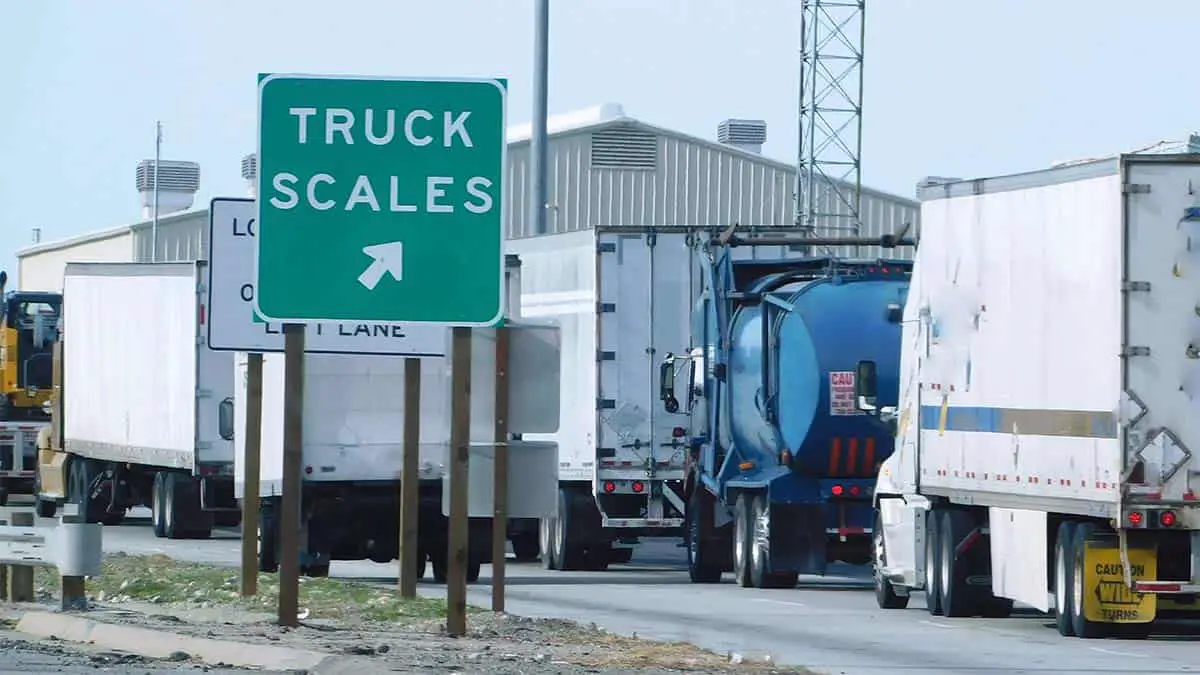Understanding The California ZEV And Near-ZEV Weight Exemption
The California ZEV and Near-ZEV Weight Exemption refers to the permission given to heavy-duty trucks to exceed California’s standard weight limits by as much as 2,000 pounds.
This permission was granted under the A.B.2061 bill of 2018, which adopted the previously established federal natural gas vehicle weight exception of 2015.
The federal natural gas vehicle weight exemption was established under the “Fixing America’s Surface Transportation Act” (FAST) to allow heavy-duty natural gas vehicles to operate without a disadvantage in terms of payload.
This blog post will explore why the ZEV / Near ZEV Weight Exemption is good for trucking companies.

Background History (Fixing America’s Surface Transportation Act “FAST”)
The Fixing America’s Surface Transportation (FAST) Act, signed into law in 2015, provided $305 billion in funding and addressed truck size and weight provisions on interstate highways.
The primary goal was to accommodate the heavier fuel and tank systems of natural gas vehicles without compromising their efficiency on federal interstate highways.
Before the FAST Act came into existence, the limitations on how much weight could be carried by heavy-duty trucks on federal highways didn’t differentiate between combustion engine and alternative cleaner propulsion systems.
What The FAST Act Weight Exemption States
The FAST Act weight exemption was established as part of the Fixing America’s Surface Transportation (FAST) Act of 2015, under Truck Size and Weight Provisions.
This legislation aimed to offset the extra weight from natural gas alternative fuel systems used by heavy-duty trucks.
The FAST Act weight exemption stated the following:
“A vehicle, if operated by an engine fueled primarily by natural gas, may exceed any vehicle weight limit (up to a maximum gross vehicle weight of 82,000 pounds) under 23 U.S.C 127, by an amount that is equal to the difference between: the weight of the vehicle attributable to the natural gas tank and fueling system carried by that vehicle; and the weight of a comparable diesel tank and fueling system.”
Basically meaning that the difference in weight due to the heavier natural gas system would be added to the applicable vehicle weight limit, effectively raising the limit.
Relevance To Heavy Duty Natural Gas Vehicles
The federal weight exemption holds particular significance for the heavy-duty natural gas vehicle sector.
This is because these vehicles, when compared to their diesel counterparts, typically have a higher overall weight due to the additional equipment required for utilizing natural gas as fuel.
What The Federal Weight Exemption Is Meant To Achieve
The primary goal of the federal weight exemption was to level the playing field for natural gas vehicles, making them more competitive with traditional diesel-and gasoline-powered trucks.
By allowing these eco-friendly trucks to exceed weight limits, they could operate without a disadvantage in terms of payload capacity.

Why Trucking Companies Back The Federal (FAST) Weight Exemption
Trucking companies support the weight exemption because it allows them to operate natural gas fuel systems in heavy-duty trucks without being at a disadvantage in terms of payload, which helps reduce emissions and cut down on truck trips.
Overall, the ZEV Weight Exemption is a win-win for both trucking companies and the environment.
The Need To Operate Without A Payload Disadvantage
One of a trucking company’s main concerns is the ability to carry as much cargo as possible. With the weight exemption for natural gas vehicles, they can operate without a disadvantage in terms of payload compared to traditional diesel-powered trucks.
California’s Adoption Of The Federal Weight Exemption
The FAST Act modified truck size and weight provisions only on the federal interstate highways, but it also allowed each state to adopt a weight limit increase of its own.
California’s adoption of the Federal weight exemption was signed into law by Gov. Jerry Brown via Assembly Bill 2061, also known as the Clean Truck Weight Bill.
The Clean Truck Weight Bill mirrors the federal FAST Act’s exemption, but it was also adapted and broadened to include any Zero Emission Vehicle (ZEV) or Near Zero Emission Vehicle.
The California implementation is known as the “Zero Emission Vehicle (ZEV) and Near-ZEV Weight Exemption” and allows zero-emission or near-zero-emission vehicles to exceed weight limits on the power unit by up to 2,000 pounds.
This adaptation reflects the state of California’s commitment to promoting the use of alternative fuel vehicles, reducing emissions, and protecting public health.

Overwhelming Support For The Clean Truck Weight Bill
This historic piece of legislation received overwhelming bipartisan support in California’s state legislature from both political parties and various industries.
Furthermore, sixty companies, including Cummins, Tesla, and Trillium, joined forces to urge Gov. Jerry Brown to pass the Clean Truck Weight Bill, seeing it as an essential step towards achieving cleaner transport methods.
The legislation is aimed at making alternative fuel trucks more competitive with their diesel and gasoline counterparts, thus eliminating a disincentive to switch from diesel to cleaner alternatives.
California’s Advanced Clean Fleets & Diesel Truck Ban
California’s Advanced Clean Fleets & Diesel Truck Ban is a statewide campaign to reduce harmful emissions from heavy-duty trucks. Here are some facts about the initiative:
- The program offers incentives for fleet operators to switch to cleaner trucks, including zero-emission and near-zero-emission vehicles.
- To qualify for the incentives, fleets must commit to purchasing a certain number of clean vehicles over a period of time.
- The goal of the program is to accelerate the adoption of cleaner technologies in the trucking industry and help California meet its greenhouse gas reduction targets.
- As part of the initiative, California has also implemented a ban on older, high – polluting diesel trucks.
- The ban requires all trucks operating within California’s ports and rail yards to meet certain emissions standards or be subject to fines.
- By 2036, all new heavy-duty trucks operating in California must meet zero-emissions standards under regulatory guidelines set by state authorities.
These efforts by California reflect a commitment to reducing pollution and promoting sustainable transportation solutions for the heavy-duty transport sector that benefit both public health and the environment.
In the context of the Advanced Clean Fleets program and the requirement to meet the deadlines on the horizon, the Clean Truck Weight Exemption is a welcome measure for trucking companies and fleet operators.
How Trucking Companies Benefit From The Weight Exemption
The California Near ZEV and ZEV Weight Exemption provides several benefits for trucking company’s operations:
- Allows operation of cleaner trucks without being at a disadvantage in terms of payload. Prior to the exemption, trucks running on alternative fuels had to carry less cargo than their diesel counterparts due to weight restrictions.
- Profit margins are protected (ability to carry more cargo means fewer journeys and lower running costs).
- Helps meet emission reduction goals as set out in Advanced Clean Fleets and the phasing out of diesel trucks.
- Ability to compete in a market that is shifting towards more sustainable options.
FAQs:
What is the Zero Emission Vehicle Weight Exemption and why do trucking companies support it?
The Zero Emission Vehicle Weight Exemption is a policy that exempts electric, hydrogen, and natural gas powered trucks from certain weight restrictions, allowing them to transport heavier loads without violating safety regulations.
Trucking companies support this policy as it reduces their running costs while reducing emissions by using cleaner, more efficient vehicles.
How does the Zero Emission Vehicle Weight Exemption benefit the environment?
By encouraging the use of electric trucks, which emit no harmful pollutants into the atmosphere, this policy helps reduce greenhouse gas emissions and improve air quality in areas with heavy truck traffic.
Are there any potential drawbacks to implementing this exemption?
Some critics argue that exempting electric trucks from weight restrictions could lead to increased wear and tear on roads and bridges due to their heavier loads.
However, advocates counter that these concerns are largely unfounded as many states already allow overweight permits for specific types of cargo.
How can trucking companies take advantage of this exemption?
This weight exemption will facilitate the transition of trucking company fleets to ZEV or Near ZEV vehicles to meet their Advanced Clean Fleets deadlines, by making the operation of a ZEV or Near ZEV heavy-duty vehicle more attractive.
Some states may also offer financial incentives or rebates for switching to zero-emission vehicles under specific conditions.
- Tesla Charger Installation Cost (Home Setups) - March 1, 2024
- Tesla Phone Key Disconnected (Troubleshooting Guide and Quick Fixes) - March 1, 2024
- Tesla FSD 12 (Explained) - March 1, 2024